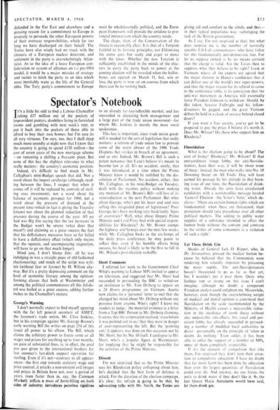George's Warning
I don't normally expect to find myself agreeing with the far left general secretary of ASSET, the foremen's trade union, Mr. Clive Jenkins; but in his campaign against Mr. George Brown's early warning Bill (he writes on page 254 of this issue) all power to his elbow. The Bill, which claims the arbitrary power to freeze sOnne or all wages and prices for anything up to four months, on pain of substantial fines, is, in effect, the qUid pro quo given to the international bankers for last summer's last-ditch support operation for sterling. Even if it's not—contrary to all appear- ances—the first step towatds statutory wage and price control, it attacks a non-existent evil (wages and prices in Britain have not, over a period of years, risen faster than in, say, the Comnaon Market); inflicts a mass of form-filling on iboth sides of industry; introduces pointless rigidities
to an already far-too-inflexible market; and has succeeded in alienating both management and a large part of the trade union movement—for whom Mr. Jenkins is merely the most vocal spokesman.
This last is important, since trade union good- will is needed for the sort of legislation that really matters: a reform of trade union law to prevent some of the worst abuses of the 1906 Trade Disputes Act (strikes in breach of an agreement, and so on). Indeed, Mr. Brown's Bill is such a patent nonsense that I can't believe it's meant to become law at all. It's no accident, surely, that it was introduced at a time when the Prime Minister knew it would be nullified by the dis- solution of Parliament. No accident, either, that Mr. Callaghan, in his mini-Budget on Tuesday, dealt with the incomes policy without making any mention of Mr. Brown's Bill—still less of its reintroduction in the next Parliament. But what about George. who's put his heart and soul into selling this misguided piece of legislation? Poor George, he's been working very hard lately. Signs of overstrain? Well, what about Deputy Prime Minister and Lord Privy Seal with special respon- sibilities for Rhodesia? As Mr. Brown stumps the highway and byways over the next few weeks, while Mr. Callaghan basks in the arc-lamps of the daily press conference, he may pause to reflect that, even if his humble efforts bring success, his head is likely to be the first to fall in Mr. Wilson's post-election reshuffle.


































 Previous page
Previous page